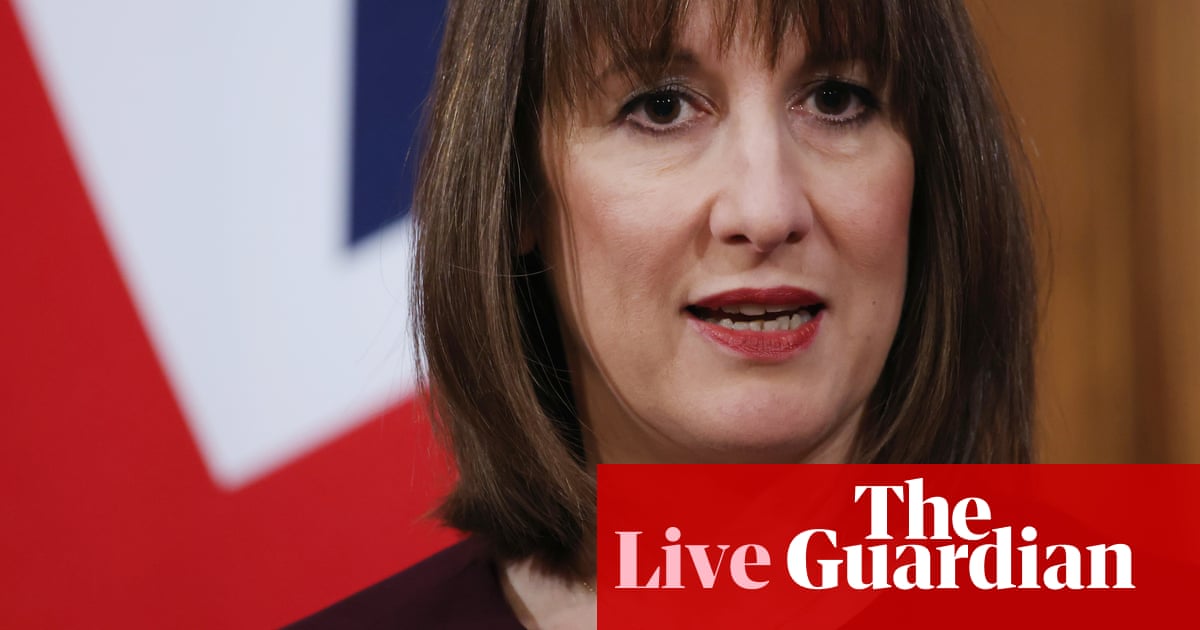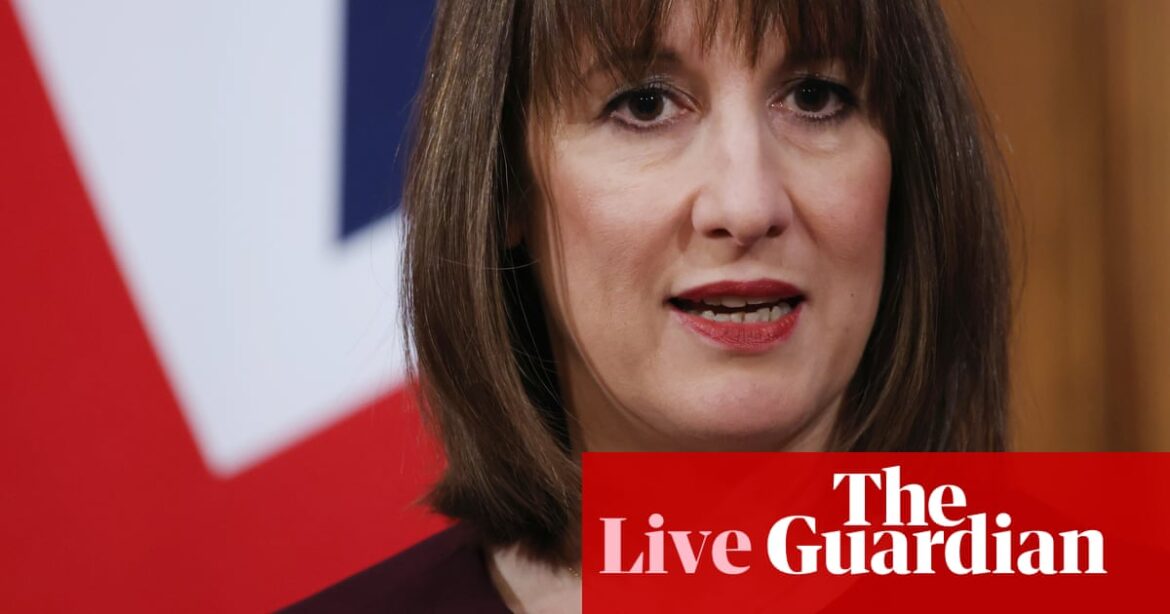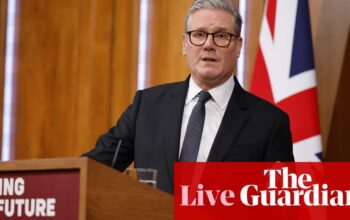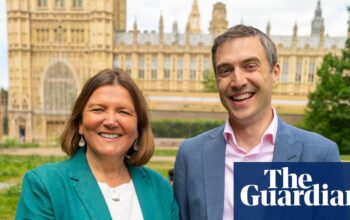
-
Johnson said that there is a good chance that Rachel Reeves will have to raise taxes in the autumn. And he claimed speculation about what taxes might rise could be economically damaging. He explained:
There is a good chance that economic and fiscal forecasts will deteriorate significantly between now and an autumn budget. If so, she will need to come back for more; which will likely mean raising taxes even further. That risks months of speculation over what those tax rises might be – a raid on pensions, a wealth tax on the richest, another hike to capital gains tax? I mention those not to commend them, far from it, but to exemplify the kinds of taxes regarding which mere speculation about increases can cause economic harm. With no sense of a tax strategy, we have no idea which way the chancellor might turn.
Reeves did not accept this when this point was put to her in interviews this morning. (See 8.07am.)
We had £9.9bn of headroom in October. We have £9.9bn of headroom today. Astonishingly the numbers are within a mere £2m of one another. It is hard to believe this is a fluke. The Treasury has clearly worked overtime to ensure that precisely the same fiscal headroom remains today as was projected in October. This is not sensible.
-
He said that, while the sickness and disability benefit cuts announced last week were “defensible” (because costs were rising so much), the decision to announce an extra £500m in cuts yesterday, just to make sure the fiscal headroom figure did not change, was a mistake.
Whilst unquestionably tough for those on the receiving end, those original cuts were defensible as a response to problems manifested by huge increases in numbers of claimants, and in spending. One could make a defence of them unrelated to the details of any particular fiscal rule. Coming back a week later with just a slightly bigger cut because that’s what’s needed to return the fiscal headroom to precisely where it was a few months ago risks undermining that case and discrediting attempts at genuine reform to the benefit system. If it was right last week to announce a halving of the health component of universal credit, it is hard to see why this week it is right to do more than that by halving it and then freezing it in cash terms.
-
He said having little fiscal headroom, and then applying the fiscal rules rigidly, was “not conducive to a sensible policymaking process”.
It is the combination of “iron-clad” pass/fail numerical fiscal rules and next to no headroom against them that is causing so many problems, leaving fiscal policy completely exposed to economic developments outside the government’s control. That is not conducive to a sensible policymaking process. This is not the OBR’s fault. It is the product of the chancellor’s choices.
Spending growth is now set to be 2.5% in 2025-26, 1.8% in 2026-27 and 1.0% in each of the subsequent three years. One should always be sceptical of plans to be prudent, but only in the future. Front-loaded or not, the problem for the chancellor is that keeping to these growth rates overall will inevitably mean cuts for some departments in the years to come.
10.52am and 2.03pm.) But in Scotland, where devolution allows gives the Scottish government powers (which is is using) to vary tax rates, and some benefit payments, child poverty has fallen, the Scottish government says. Relative child poverty in Scotland is 9 points lower than in the UK as a whole.
In a news release it explains:
Annual statistics published today show that compared with the previous year’s statistics, relative child poverty in 2023-24 reduced from 26% to 22% in Scotland while absolute child poverty fell from 23% to 17%. UK poverty statistics published today show levels of relative child poverty at 31% and absolute child poverty at 26%.
Modelling published today suggests that UK government policies are “holding back” Scotland’s progress. It estimates the UK government could reduce relative child poverty by an additional 100,000 children in 2025-26 if it heeded Scottish government calls to end the two-child limit, replicate the Scottish child payment in universal credit, remove the benefit cap and introduce an essentials guarantee.
Commenting on the figures, Shirley-Anne Somerville, the Scottish government’s social justice secretary, said:
Eradicating child poverty is the Scottish government’s top priority and we are committed to meeting the 2030 targets unanimously agreed by the Scottish parliament.
Our policies are having to work harder than ever to make a difference, against a backdrop of a continuing cost of living crisis, rising energy costs and UK government decision making. However, we know these policies are working.
Statistics published today show that, although we have not met the interim child poverty targets, the proportion of children living in relative poverty has reduced and year-on-year rates are now lower than they have been since 2014-15, while the proportion in absolute poverty has also fallen with the annual figure the lowest in 30 years.
This briefing from the Fraser of Allender Institute has more on Scotland’s child poverty record. It includes this chart.
11.57am.)
Starmer said people predicted the government would raise in the spring statement. But it didn’t.
He said he would not write budgets in advance. But he went on:
Obviously, I’m not going to write future budgets. Every prime minister and every chancellor, from every government, always takes that position.
But if you look at the pattern, or the intent, from both the budget and the spring statement, you’ll see that when it’s come to the decisions we’ve had to make, we have not taken a decision to increase tax. And I think that indicates the mindset that we bring to this.
Starmer was referring to taxes for workers. The last budget did put up taxes hugely for businesses, and it raised some taxes affecting the wealthy.
Ukraine?
Starmer says this is a process. A lasting peace is the right goal, he says. It is what Trump wants, and what the Europeans want.
If they can provide leadership, backed up by operational plans, that is the best chance for peace.
Bowen tried twice to get Starmer to addresss his point about Russia, but both times Starmer refused to engage with Bowen’s point.
Ukraine, despite a partial ceasefire agreement that was supposed to stop this.
He says Russia is “filibustering … playing games and then playing for time”.
Leaders at the summit today said they would not let Russia drag this out, he says.
10.52am.)
Today’s statistics also show:
-44% of all children living in poverty are living in a household where someone is disabled
-72% of poor children live in working families
-44% of children in families with 3 or more children are in poverty, far higher than families with 1 child (21%) or 2 children (25%)
-Poor families have fallen deeper into poverty. There are 3.1 million children in deep poverty compared to 2.9 million children last year (i.e. with a household income below 50% of after-housing-costs equivalised median income)
-48% of all children in poverty were in families with a youngest child aged under five
-49% of children in Asian and British Asian families are in poverty, 49% of children in Black/ African/Caribbean and Black British families, and 24% of children in white families
-43% of children in lone parent families were in poverty, higher than the couples rate of 26%
-More children in poverty are growing up in privately rented homes – 1.7 million, a record high, up from 1.1 million in 2010/11
-The three-year average poverty rate has fallen in Scotland from 24% to 23% (one-year from 26% to 22%) and has risen in England from 30% to 31%, in Northern Ireland from 23% to 24%, and in Wales from 29% to 31%
And here is some more reaction from charities, who are urging the government to respond to the figures by changing policy.
Philip Goodwin, chief executive officer at UNICEF UK, said:
The UK has seen the highest increase in child poverty of any OECD and EU country in the past decade and today’s shocking figures show the situation is getting worse. Now record numbers of the UK child population are living below the poverty line, many of whom are under 5 years old …
The prime minister promised action to break the link between background and future success and reduce the number of children living in poverty. But with the cuts announced in yesterday’s spring statement predicted to increase this figure, the government must show it is serious by calling an immediate end to the two-child limit and benefit cap in its child poverty strategy. This one step would lift hundreds of thousands of children out of poverty.
And Silvia Galandini, Oxfam’s domestic poverty lead said:
These latest poverty figures are as damning as they are heartbreaking – almost one in three children are living in poverty across the UK. This is before yesterday’s brutal cuts, where the chancellor chose to remove vital security and safety from those who need it the most instead of taxing the super-rich.
12.21pm.)
Members across parties and at all levels of seniority were visibly shell-shocked and emotional following the announcement by McKelvie’s partner, SNP depute Keith Brown, that she had died this morning. The drugs and alcohol minister stepped back from parliamentary duties last summer after revealing that she had secondary breast cancer.
McKelvie, who was first elected in 2007, was held in deep affection and it was notable how many women MSPs described how she had taken them under her wing when they first joined Holyrood.
The usual combative questioning at FMQs was far more muted, though John Swinney had opportunity to take a swipe at yesterday’s spring statement, saying it would make his mission to eradicate child poverty much harder, and highlighting the direct impact that welfare cuts will have on Scottish government finances, with the Fraser of Allander Institute estimating they may amount to a £400m loss to Scotland’s block grant.
8.46am.)
But the Institute for Fiscal Studies has cast doubt on this argument. In one of the presentations at the news conference this morning, where it was giving its detailed assessment of the spring statement, it said the pro-job measures in the Pathways to Work green paper would just have a “small” poverty-reduction impact.
Here is the relevant slide from the presentation.
There is an example of how hard it can be to get people off sickness and disability benefits and into work in the Pathways to Work green paper published last week. As an example of a good programme in this area, the green paper cites additional work coach support, saying this can increase people’s chances of getting a job by a third. But the figures show this means 11% of participants finding work, instead of 8% in the control group. Paragraph 226 says:
We have good evidence that when people receive support it has an impact. For example, additional work coach support, where people on the health journey spent more time with a work coach, found that voluntary participants in the LCWRA [limited capability for work-related activity – a universal credit category for people judged too sick to work] group were a third more likely to be in work than a comparison group 12 months later. 11% of participants were in work 12 months later, compared to 8% of the comparison group.
Keir Starmer is expected to hold his press conference in Paris within the next half an hour.
Source: theguardian.com



